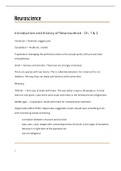College aantekeningen
Neuroscience - Lecture notes Exam 1
- Vak
- Neuroscience
- Instelling
- Rijksuniversiteit Groningen (RuG)
Detailed lecture notes from the lectures for exam 1 in the minor Neuroscience. Useful as a replacement or refresher for the lectures when studying for the exam!
[Meer zien]




